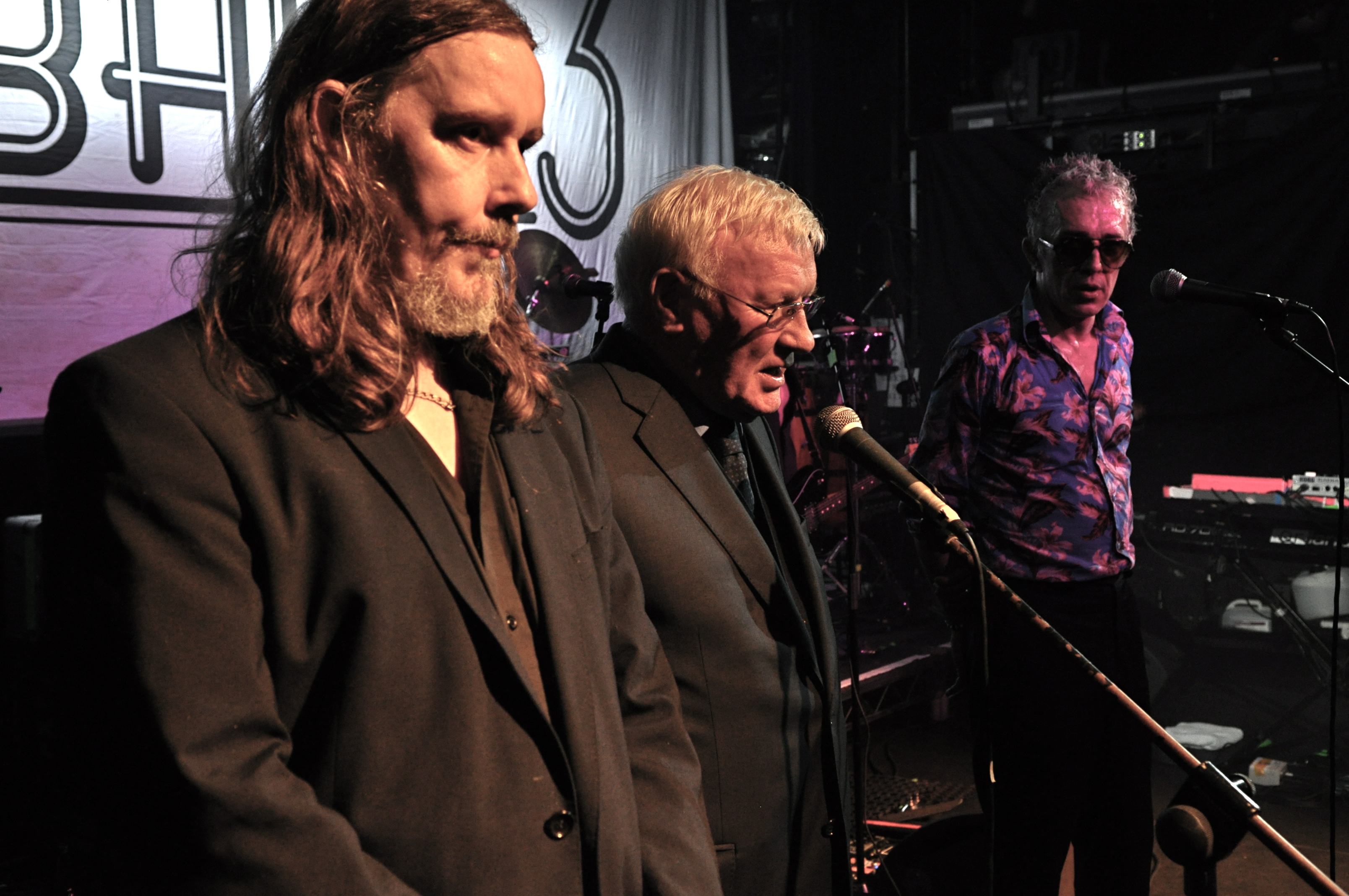Preaching the gospel of revolution to a backing track of stomping acid house techno and melancholy country music while fighting for those wrongly accused, Francis Donohoe steps into the righteous world of Alabama 3.
They’re not from Alabama, and the band numbers well more than three but that’s the type of contradictions that the globe’s leading practitioners of acid house gospel thrive on.
Here’s another, Alabama 3’s most famous tune – Woke Up This Morning – the theme to the Sopranos has become synonymous with the machismo gun culture of the hit TV series. But the song is actually an ode to a particular type of female empowerment, being inspired by the case of Sara Thornton who killed a husband she accused of years of violent abuse.
Alabama 3 came together in the mid 1990s when founding duo Rob Spragg and Jake Black decided a fusion of country and dance music was just what was needed to reboot an increasingly commercialized dance music scene.
When LookLeft caught up with the lads prior to their October concert in Dublin’s tripod venue we were half expecting to meet the two southern drawl hipsters – Larry Love and The Very Reverend Dr D. Wayne Love – who front the Alabama 3 posse on stage.
Instead we met the men behind the personas, whose upbringings in tight knit working class communities in the Glasgow docklands and pit towns of south Wales continues to define their world view and as Rob makes clear, in his energetic Welsh twang, their music.
“The energy we very much pick up on was the acid house warehouse scene which was about young people collectivizing around a sound system in disused industrial buildings, it was post capitalism, futurist… for a brief time, before it got re-appropriated by the mainstream established dance music industry, and it was for a period quite a radical movement.”
It certainly was seen as a threat by the British Conservative government who introduced a 1994 Public Order Bill specifically aimed at banning open air events which featured music with “repetitive beats”. If marrying radical politics and dance music makes sense, for Alabama 3 so did the blending of an “acid house stomp and a country stomp.”
“I’m the son of preacher whose father was a miner, Jake’s father worked in the docks, it was part of our culture, you would go down to the pub and hear country music. It was a transferred genre, Miners pretending they were cowboys, it was ridiculous, but there was a community feel about it”, Rob explains
As Jake puts it “every time you stuck yer heid round the pub door looking for yer ma and da there was somebody up the corner with keyboard and cowboy hat singing a country and western song, I’m I right or I’m a right?”
The father Jake would search the pubs for was a senior figure in the Communist Party of Scotland. Jake’s own form of “teenage rebellion” saw him join the Trotskyite Militant tendency, but his father’s non-sectarian Left politics inform his own.
“My da was in the CP all his life, he had a thing he used to say, we sit in the pub and argue with the SWP, we argue with the trots we argue with this we argue with that, the bosses don’t they are 25 years down the road.”
Anger is still evident when the Glaswegian describes the destruction of the self confident working class community he grew up in. He places emphasis on the 1984 Miners Strike, during which he served as a flying picket backing up striking workers across Britain, as the culmination of a worked out establishment agenda.
“What we saw was the manufacturing base being decimated and nothing replacing it. In the early seventies when we had the three day week and that, we put them back (Tory Prime Minster Edward) Heath resigned in ‘74, but they came back in ‘84. By that time they had ten years over us.”
“They had made deals to buy coal elsewhere, they did it with this American business man Ian Mac- Gregor, Thatcher’s advisor, who all of a sudden became heid of the national coal board and he’s there to get Mr Scargill and the rest of the union leadership. They were successful in ‘84.”
Rob saw the destruction of the mining industry first hand, and with the end of these jobs “the valleys filled with smack.”Jake, who witnessed the emergence of similar problems in Glasgow , believes it was more than coincidence that working class communities were now under attack from many fronts – “these were systematic moves… drugs became epidemic as the manufacturing base was being decimated and working class institutions were also being eaten away at. That isn’t some daft conspiracy theory, I’ve always agreed with Gramsci when he says what is a conspiracy? A conspiracy is what you call incorporation and mediation, people incorporate and group and then take on somebody else’s business, they send in middle men who mediate then take the assets and destroy them and subsume the company,” Jake sees such systems in play in the decline of the organized working class.
Alabama 3 have committed themselves to doing what they can to see their class reorganised currently playing a series of concerts in conjunction with Bob Crowe’s RMT union. As Jake puts it “We try everyday to make people aware it’s no a daft idea tae benefit from the sweat of your labour, it’s no a daft idea to have a minimum wage, it’s no a daft idea to have a manufacturing base, it’s no a daft idea to have a 35 hour week.”
Rob believes that the Left must also change “I’m not sure if we’ll ever return to a manufacturing base and that kind of solid constituency were you can mobilise support, but I think what’s interesting is that young kids might not be organising necessarily around what was formally the work place but what is happening now is organising on a lot more global level.”
“If you look at the G8, G20 protest people are using the internet to organise around a collection to micro causes, how do you harness that? It’s very difficult if you’re used to traditional ways I think young people need an approach to what you could call Marxism or whatever to see socialism remains a fucking option. Everybody wants to shoot the banker now and I think it is imperative to the left to find some language or means by which you can harness that attitude and organise it.”
Jake concurs that young people may not find socialism the same way as his generation did “reading Marx, Lenin, Trotsky”, a version of one of the later’s famous maxims “if you can’t familiarise a man with the rationale of dialectic materialism, familiarise his heid with the pavement,” he especially treasures.
“They might not find socialism through that but they might find ideas about monetarism and other things other ways, it is up to people that understand socialism to take that mantle and explain it.”
But the Alabama 3 are not about forcing messages on their audience, rather it’s backdrops of Lenin on a mobile phone, or samples of political speeches by which they promote their message, “the politics of seduction” as Rob terms it.
“There is no point standing up on your soap box at a gig and telling them about dialectical materialism you get their arses moving on the dance floor and then perhaps at the end of the night they’ll be asking who was Mao se Tung, why are they on about the Tendency and Chomsky. Ultimately our only agenda is to tune in these micro communities of dissent on to it if they want to.”
Although Jake is confident “We are seeing the death throes of monetarism,” the lads except that pessimism can still overshadow the Left, as Rob points out “on a Tuesday after a hard weekend you can nearly feel like a Tory.”
Before going on stage for a rapturous set, during which the band is joined by Sean Garland whose campaign against extradition they support, we end the interview with the lads posing a couple of their own questions. Rob feeling that the form of resistance pursued in earlier decades will not return – “but what are the next clothes of resistance we are going to wear?”
Jake believes that; “there is still enough there to build a new broad left, we don’t know what the answers are but we’re trying to find them.”





